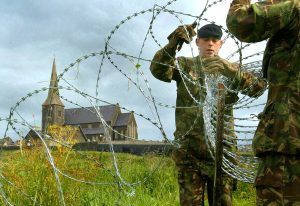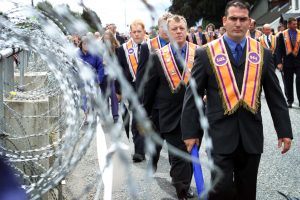Citizen Involvement in Parades in Northern Ireland
Participación ciudadana en decisiones sobre desfiles en Irlanda del Norte
Participation des citoyens aux défilés en Irlande du Nord
Lessons from Reformers
This case study was originally posted in the OGP Global Report.
In Northern Ireland, parades, processions, carnivals, and commemorations are core to cultural, political, and religious traditions. Unfortunately, parades have been marred by– and are sometimes the impetus for– sectarian violence. This comes to a head during the annual “marching season” between March and August. Participants often carry flags and other emblems that their neighbors consider inflammatory.
In 1998, preceding the Good Friday accords, the Northern Ireland Parades Commission was established to approve permits for parades.1 While it is not without critics, its establishment offers two positive lessons for countries struggling to balance public order and safety with freedom of assemblyPeaceful assembly — a fundamental human right — is essential to healthy and effective democratic institutions. Technical specifications: Protection of the individual right to peacefully assemble, ... More:
- Removing the police from decision-making around parades. The first major accomplishment of the Parades Commission was to move the permitting decision from the police department (previously the Royal Ulster Constabulary, now the Police Service of Northern Ireland). This allowed the police to focus on maintaining public order rather than judging the legitimacy of each parade.
- Citizen voice in monitoring freedom of assembly. The quasi-judicial body is made of citizens that compete for nominations by the Secretary of State of Northern Ireland.

Members of the British army prepare barricades in the fields around Drumcree Church, Portadown, Northern Ireland, July 5, 2003. The Parades Commission has again banned Orangemen from marching down the mainly Catholic Garvachy road, which has previously led to violence between marchers and security forces in their attempt to do so. REUTERS/TobyMelvilleTM/MD
Despite initial success, there has been concern about the Parades Commission. In 2013, the UN Special Rapporteur on the Rights to Freedom of Peaceful Assembly and of Association (see “Guidance and Standards: UN Special Rapporteur’s Guidance” later this section), at the invitation of the UK government, issued a report on the sensitive issue. The Northern Ireland Human Rights Commission followed with another report on how best to balance the competing demands for assembly and security.
The two human rightsAn essential part of open government includes protecting the sacred freedoms and rights of all citizens, including the most vulnerable groups, and holding those who violate human rights accountable. T... bodies’ reports, followed by action by the Parades Commission, resulted in a framework called “Resolution by Dialogue.” It mapped the competing considerations of different human rights (e.g. freedom from violence and religious freedom) and invited participants and affected communities to suggest ways of improving the process. Interestingly, the resolution by dialogue was based on the participatory approach in the Framework Convention on National Minorities, which requires the state to foster dialogue and mutual understanding; specifically, governments must allow minority groups to voice their opinions. Governments must also provide dialogue in accordance with OSCE Guidelines on Assembly (see box at the end of this section), which emphasize voluntary dialogue as a necessary first step before escalation to legal means such as banning a particular parade.
While the guidance is in place, some of the most controversial civic groups do not recognize the legitimacy of the body. Nonetheless, Northern Ireland offers a promising approach to citizen dialogue in promoting and protecting the right of assembly within broader security concerns.
1: The Public Processions Act gave the Parades Commission a statutory footing as well as the adjudicatory powers recommended by the North Report (P North, O Crilley, and J. Dunlop, J., Report of the Independent Review of Parades and Marches (Belfast: The Stationery Office, 1997)).
Photo Credit: Thomas Pajot, Adobe Stock
Este caso de estudio se publicó originalmente en el OGP Informe Global.
En Irlanda del Norte los desfiles, procesiones y conmemoraciones son parte elemental de sus tradiciones culturales, políticas y religiosas. Desafortunadamente, los desfiles se han viciado y en algunos casos son motivo de violencia. Lo anterior alcanzó su punto máximo durante la temporada anual de desfiles que ocurre entre marzo y agosto. Los participantes suelen portar banderas y otros emblemas que sus vecinos consideran incendiarios.
En 1998, previo a las celebraciones de Viernes Santo, se creó la Comisión de Desfiles de Irlanda del Norte con el fin de otorgar permisos para la organización de desfiles.1 Si bien se ha criticado esta decisión, ofrece dos lecciones positivas para los países que están tratando de equilibrar el orden público y la seguridad y la libertad de asamblea:
- Eliminar a la policía de la toma de decisiones sobre desfiles: El primer gran logro de la Comisión de Desfiles fue asegurar que la policía no participe en la emisión de permisos (anteriormente Royal Ulster Constabulary, hoy Servicio Policiaco de Irlanda del Norte). Lo anterior permitió que la policía se enfocara en mantener el orden público, más que en juzgar la legitimidad de los desfiles.
- Dar voz a los ciudadanos en el monitoreo de la libertad de asamblea: Este organismo cuasi judicial se compone de ciudadanos que compiten por nominaciones por parte del Secretario de Estado de Irlanda del Norte.
A pesar de los avances logrados, existen inquietudes al respecto de la Comisión de Desfiles. En 2013, el Relator Especial de la ONU sobre Derechos de Libertad de Asamblea Pacífica y de Asociación (ver “Lineamientos y Estándares de Libertad de Asamblea Pacífica y Asociación”, más adelante en esta sección), por invitación del Gobierno del Reino Unido, presentó un informe sobre un tema sensible. Más adelante, la Comisión de Derechos Humanos de Irlanda del Norte publicó otro informe sobre cómo equilibrar las exigencias de asamblea y seguridad.
Los dos informes publicados por organismos de derechos humanos, seguidos por medidas tomadas por la Comisión de Desfiles, resultaron en la creación de un marco llamado “Resolución por Diálogo”, el cual mapea las diferentes consideraciones de derechos humanos (por ejemplo, la libertad de protección contra la violencia y la libertad de religión) e invita a los participantes y comunidades afectadas a presentar sugerencias para mejorar el proceso. Cabe mencionar que la resolución por diálogo se basó en el enfoque participativo de la Convención Marco de Minorías Nacionales, la cual exige que el Estado promueva un diálogo y comprensión mutua; específicamente, los gobiernos deben permitir a las minorías expresar sus opiniones. Además, los gobiernos deben abrir un diálogo de acuerdo con los Lineamientos de Asamblea de la OSCE (ver el recuadro al final de esta sección), los cuales hacen énfasis en el diálogo voluntario como un primer paso antes de la escalación a medios legales, por ejemplo cancelar o prohibir un desfile en particular.
Aunque los lineamientos están activos, algunos de los grupos más controversiales no reconocen la legitimidad del organismo. Sin embargo, Irlanda del Norte ofrece una metodología prometedora al diálogo ciudadano para proteger el derecho de asamblea en el marco de la seguridad de la ciudadanía.
1: The Public Processions Act gave the Parades Commission a statutory footing as well as the adjudicatory powers recommended by the North Report (P North, O Crilley, and J. Dunlop, J., Report of the Independent Review of Parades and Marches (Belfast: The Stationery Office, 1997)).
Cette étude de cas a été initialement publié dans le OGP Rapport Mondial.
En Irlande du Nord, les défilés, processions, carnavals et commémorations sont au cœur des traditions culturelles, politiques et religieuses. Malheureusement, les défilés ont été entachés par la violence sectaire; ils ont également parfois été le déclencheur. Elle atteint son paroxysme pendant la « saison annuelle des marches » entre mars et août. Les participants emportent souvent des drapeaux et d’autres emblèmes que leurs voisins qualifient de provocateurs.
En 1998, avant les accords du Vendredi saint, la Northern Ireland Parades Commission a été constituée pour approuver les permis de défilé.1 Si elle ne s’est pas faite sans critiques, sa constitution offre deux enseignements positifs à l’endroit des pays qui s’efforcent de trouver l’équilibre entre l’ordre public et la sécurité et la liberté de réunion :
- Éliminer les policiers de la prise de décision concernant les défilés. La première grande réussite de la Parades Commission consistait à retirer la responsabilité de délivrer les permis au service de police (anciennement, le Royal Ulster Constabulary, désormais appelé Police Service of Northern Ireland). Cette décision a permis aux policiers de se concentrer à assurer l’ordre public plutôt que d’établir la légitimité de chaque défilé.
- Expression citoyenne relative à la surveillance de la liberté de réunion. L’organisme quasi-judiciaire est constitué de citoyens qui se font concurrence pour obtenir une nomination du Secretary of State of Northern Ireland.
Malgré un succès initial, la Parades Commission a suscité certains doutes. En 2013, le Rapporteur spécial des Nations unies sur la liberté de réunion et d’association (voir « Directives et normes : directives du Rapporteur spécial des Nations unies » plus loin dans la présente section), à l’invitation du gouvernement britannique, a produit un rapport sur la question délicate. La Northern Ireland Human Rights Commission a ensuite produit un autre rapport sur la meilleure manière de soupeser les demandes conflictuelles de réunion et de sécurité.31
Les rapports des deux organismes sur les droits de la personne, suivis par des mesures de la Parades Commission, ont donné lieu à un cadre intitulé « Resolution by Dialogue ». Le cadre faisait le point sur les aspects contradictoires des différents droits de la personne (comme la protection contre la violence et la liberté de religion) et invitait les participants et les collectivités affectées à suggérer des améliorations au processus. Il est intéressant de souligner que la résolution par le dialogue reposait sur l’approche participative de la Convention-cadre sur les minorités nationales, qui oblige l’État à favoriser le dialogue et la compréhension mutuelle; plus particulièrement, les gouvernements doivent permettre aux groupes minoritaires d’exprimer leurs opinions. Les gouvernements doivent aussi assurer un dialogue en vertu des lignes directrices de l’OSCE concernant les réunions (voir l’encadré vers la fin de la présente section) qui insiste sur le dialogue volontaire en tant que premier pas nécessaire avant d’emprunter la voie judiciaire comme l’interdiction d’un défilé donné.
S’il y a des directives, certains des groupes citoyens les plus controversés ne reconnaissent pas la légitimité de l’organisme. Néanmoins, l’Irlande du Nord propose une approche prometteuse de dialogue citoyen en favorisant et en protégeant le droit de se réunir dans le cadre de craintes plus larges en matière de sécurité.
1: The Public Processions Act gave the Parades Commission a statutory footing as well as the adjudicatory powers recommended by the North Report (P North, O Crilley, and J. Dunlop, J., Report of the Independent Review of Parades and Marches (Belfast: The Stationery Office, 1997)).
No comments yet
Related Content

Global Report
The promise of democracy is often defined by the ballot box, where citizens determine who will represent their interests in government. That promise, however, too often fails to translate to…


Leave a Reply